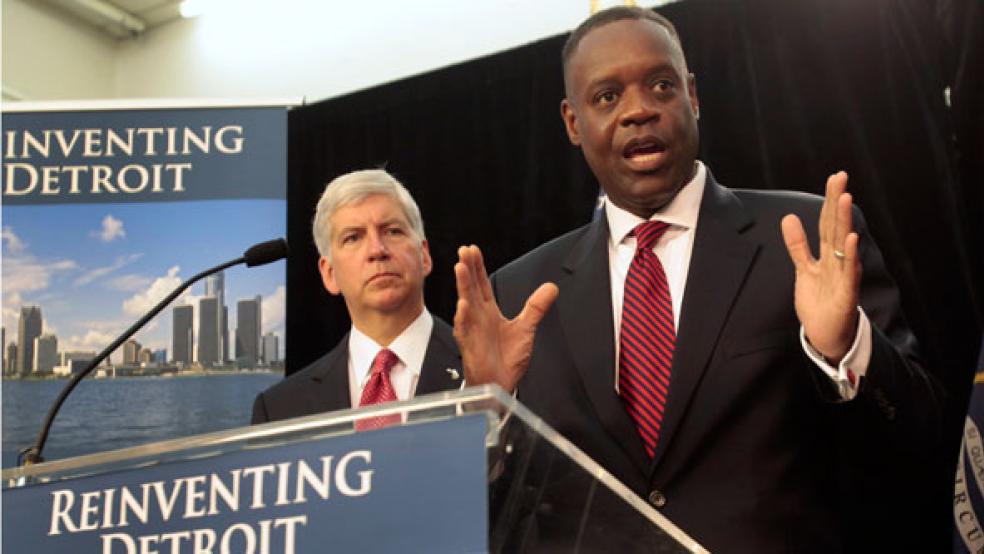Jay Z is in for a shock. He, along with Madonna and Stevie Wonder, are boycotting Florida, in protest of the “Stand Your Ground” law that they say allowed the George Zimmerman, who shot Trayvon Martin, to go scot-free.

Does he know that 22 other states have similar laws? Will he no longer perform in Pennsylvania, Texas, New Hampshire or Utah? How about Michigan?
That’s right, Michigan – home to bankrupt and crime-ridden Detroit – passed a law with bipartisan support in 2006 that permits a person to defend themselves when they “honestly and reasonably” believe that they are threatened. In adopting the provision, lawmakers cited the recent increase in home invasions, and also a case from 1925, in which the home of a black doctor named Ossian Sweet was surrounded by angry white men, one of whom was killed by shots fired from the house. A jury found the doctor innocent, since he was defending his home. You likely won’t hear much about that precedent in today’s overheated debate.
RELATED: THE BIGGEST RACIAL PROBLEM NO ONE IS TALKING ABOUT
Once again, Americans are considering issues of crime and race – and many are calling to do away with the Stand Your Ground provision on the basis that it encourages violence. Other tough crime prevention measures – like Stop & Frisk in New York- are also under attack. Once again, the people who are actually the victims of crime are mostly left out of the conversation.
In New York, the Stop & Frisk policies of Police Chief Ray Kelly are criticized as racist, except by those residents who know their communities have become safer because of the aggressive police tactics. In 2012 the number of civilian complaints about the NYPD fell to the lowest in five years. Kelly received kudos from 75 percent of New Yorkers in a poll conducted earlier this year; 81 percent of whites approved of the job Kelly is doing, along with 76 percent of Hispanics and 63 percent of blacks.
The NYPD has long defended in-your-face policing by noting that blacks and Hispanics are victims of more than 80 percent of all murders, non-negligent homicides and felonious assaults; those groups also suffered 75 percent of all rapes and 68 percent of robberies committed in 2012.
Who benefits most from tougher law enforcement? Everyone, but especially those communities where crime is rampant.
That’s why Detroit has sought the help of some policy makers close to New York’s successful war on crime. While New York’s growth and job creation has undoubtedly benefitted from reduced crime and improved confidence on the part of businesses and home owners, Detroit has spiraled downward as murders and mayhem increase.
Alarmed by those trends, Detroit has teamed up with the Manhattan Institute, a right-wing think tank that is helping to export some of New York’s most effective anti-crime programs to the Motor City.
Working with the Detroit Police Department and the Michigan Department of Corrections, MI fellows George Kelling (who has worked with numerous police departments and is best known for so-called “broken windows” policing) and Michael Allegretti helped launch pilot programs in the Grandmont-Rosedale and East English Village communities of Detroit to rein in home invasions. The emphasis is on crime prevention, and it is working. In one year, the number of home invasions in the Grandmont-Rosedale area is down 26 percent - an impressive outcome.
The program relies on community involvement, and Grandmont-Rosedale was chosen for the pilot with care. “Grandmont Rosedale has one of the highest home ownership rates” says Allegretti. “It’s stable, with a lot of people invested in the community.”
RELATED: DETROIT'S 60-YEAR DECLINE INTO BANKRUPTCY HELL
The approach is three-fold. First, they introduced community policing. The team polled residents on how to identify suspicious behavior, and then trained them to report potential threats to the police. Cops, meanwhile, were pressed to get out and interact with residents, talk to kids playing basketball, or check in with shop keepers. When you open lines of communication you dial down suspicions.
Third, and most innovative, the police and corrections officials visited the homes of people on probation – those most likely to rob again. Allegretti says that these “worst offenders” were told they were being watched carefully. They were given contact information for a non-profit called the Greater Detroit Center for Working Families – a group dedicated to helping people find jobs and become self-sufficient. They were told they had a choice: repeat their crimes and head right back to jail, or seek help in turning their lives around. Allegretti says, “None took the offer, but none has been arrested for a crime, either.”
Detroit brass is pleased with the program, and intends to broaden its use. It sounds good, and heaven knows Detroit needs all the help it can get. It especially needs community help with crime, since its fiscal issues prevent beefing up the police force. But, with the outcry about the Martin case, the program could be vulnerable.
George Zimmerman was, after all, a neighborhood watch leader, performing the kind of surveillance that is being carried out in Grandmont-Rosedale. Community members in Detroit are patrolling their neighborhoods by car, carrying radios to alert police to suspicious activity. With emergency wait times reportedly averaging 58 minutes, how long will it be until someone decides to prevent a home break-in on his own? How will the authorities respond?
Eric Holder has promised to take a “hard look” at Stand Your Ground laws, and President Obama has voiced reservations about the approach. Their antipathy may put a chill in community police efforts; meanwhile, any change to such legislation could increase the potential liability of residents active in programs like those of Detroit. Overreacting to the tragic death of Trayvon Martin by doing away with safeguards for those protecting their homes or their communities would compound the misfortune.
Let us hope that cooler heads – and those most at risk from violent crime -- prevail.






